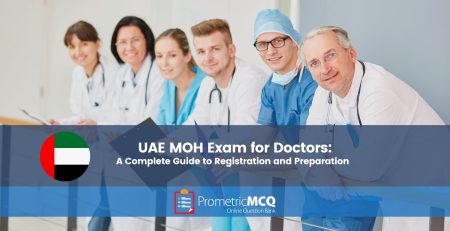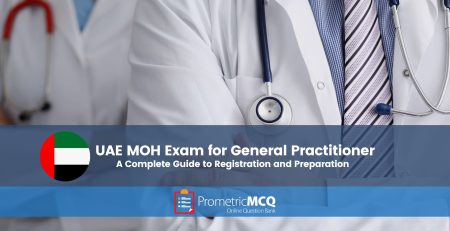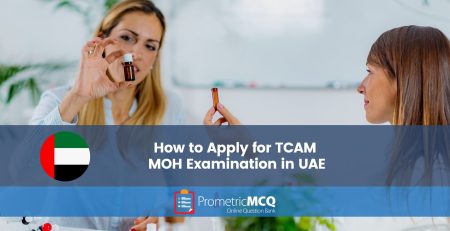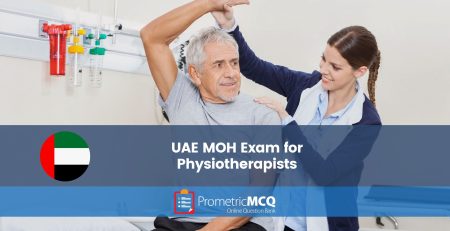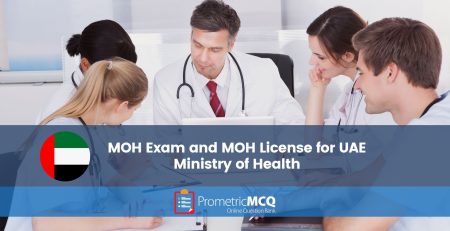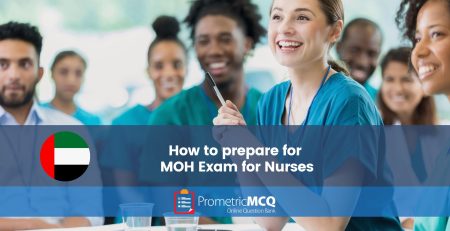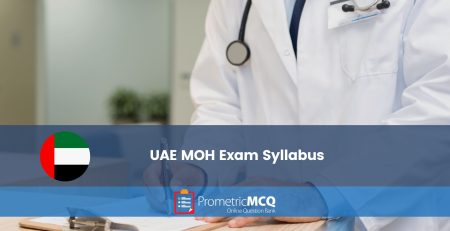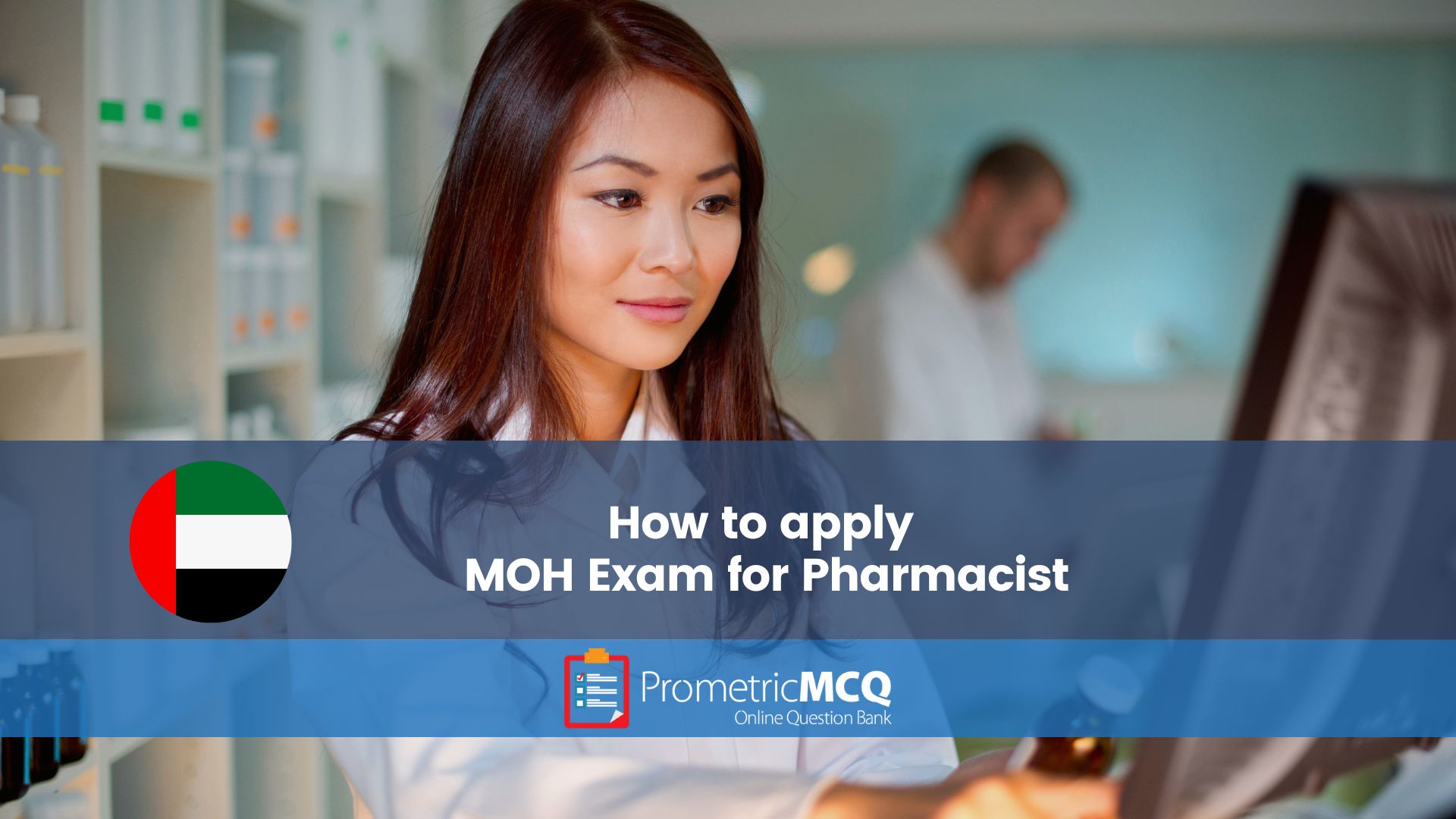
How to apply MOH Exam for Pharmacist
Webmaster2024-03-22T04:35:17+00:00Are you a pharmacist looking to practice in the United Arab Emirates? The first step is passing the UAE Ministry of Health – MOH Exam for Pharmacists. In this comprehensive guide, we will walk you through each step of the application process to help you achieve your goal of practicing pharmacy in one of the most dynamic healthcare systems in the world. Let’s get started on your journey towards success!
Table of Contents
ToggleIntroduction to the UAE MOH Exam for Pharmacists
The United Arab Emirates (UAE) is a rapidly growing country that offers many opportunities for healthcare professionals, including pharmacists. In order to practice as a pharmacist in the UAE, individuals must pass the Ministry of Health (MOH) Exam. This exam assesses the knowledge, skills, and competency of pharmacists to ensure they meet the standards and regulations set by the MOH.
The MOH Exam for Pharmacist is designed to evaluate an individual’s ability to provide safe and effective pharmaceutical care in accordance with international standards. It covers various topics such as pharmacy laws and regulations, drug therapy management, pharmaceutical calculations, and patient counseling.
One of the main reasons why pharmacists choose to work in the UAE is because it offers a competitive salary package along with other benefits such as tax-free income, accommodation, health insurance, and yearly paid leave. Moreover, working in the UAE allows pharmacists to gain valuable experience working with a diverse patient population from different cultural backgrounds.
To be eligible to take the MOH Exam for Pharmacists in the UAE, applicants must meet certain requirements set by the MOH. These include having a Bachelor’s degree in Pharmacy or Pharmaceutical Sciences from a recognized university or college. Additionally, applicants must have at least two years of post-graduation work experience as a licensed pharmacist.
The application process for the MOH Exam for Pharmacists can be done online through their official website or through authorized testing centers located globally. The first step is to register for an account on their website using your personal information and academic credentials. Once registered, you can fill out an online application form and upload all required documents such as your CV/resume, educational certificates/degree transcripts, passport copy with valid residency visa page (for non-UAE residents), professional license/certificates from previous employers if any.
After completing your application and submitting it online along with all necessary documents within their specified deadline date, you will receive an email confirmation containing instructions about the next steps in the application process. This may include scheduling your exam date, location, and payment of fees.
Passing the MOH Exam for Pharmacists is a crucial step towards becoming a licensed pharmacist in the UAE. It not only opens up career opportunities but also ensures that pharmacists are providing safe and effective care to patients. With proper preparation and meeting all requirements, you can successfully pass the MOH Exam for Pharmacists and begin your journey as a pharmacist in this dynamic country.
Eligibility Requirements for the MOH Exam for Pharmacists
The UAE MOH Exam for Pharmacists is a crucial step in obtaining a MOH license to practice pharmacy in the United Arab Emirates. It ensures that pharmacists possess the necessary knowledge and skills to provide safe and effective healthcare services to patients.
To be eligible for the UAE MOH Exam for Pharmacists, there are certain requirements that must be met. These eligibility criteria are set by the Ministry of Health and are strictly enforced. In this section, we will discuss in detail the various requirements that applicants must fulfill before they can apply for the exam.
- Educational Qualifications:
The first and foremost requirement for taking the MOH Exam for Pharmacists is having a degree in Pharmacy from a recognized institution. The degree must be equivalent to a Bachelor’s degree or higher, with at least four years of study. Additionally, candidates must have completed an internship program of at least six months under a registered pharmacist. - Work Experience:
Candidates must have at least two years of work experience as a licensed pharmacist after completing their degree. This experience can be gained either in the candidate’s home country or abroad but should be relevant to clinical pharmacy practice. - Registration/License:
Applicants must hold a valid registration or license from their respective Pharmacy Council or Board in their home country. This registration should not be expired or revoked. - Good Standing Certificate:
Candidates must obtain a good standing certificate from all previous employers as well as from their Pharmacy Council or Board where they hold registration/licensure. - Application Fee:
To apply for the MOH Exam, candidates must pay a non-refundable application fee of AED 500. This fee can be paid online or at designated bank branches.
Fulfilling these eligibility requirements is a crucial step in the process of applying for the UAE MOH Exam for Pharmacists. It is important to carefully review and fulfill all of these requirements before submitting your application to avoid any delays or rejections.
Step 1: Registering on the UAE MOH website
The first step in applying for the UAE MOH Exam for Pharmacists is to register on the official website of the Ministry of Health (MOH). This process is essential as it will provide you with a unique identification number that will be required for all future interactions with the MOH.
To register, you will need to visit the MOH website and click on the “Registration” tab. You will then be directed to create an account by filling out personal details such as your name, date of birth, nationality, and contact information. It is crucial to ensure that all information provided is accurate and matches your official documents.
After creating your account, you will receive a confirmation email from MOH containing your login credentials. You can use these credentials to access your account at any time in the future.
Once registered, you can log in to your account and fill out a detailed application form. This form includes sections for personal information, educational background, work experience, and language proficiency. It is crucial to fill out this form accurately as any discrepancies or false information may result in rejection of your application.
In addition to personal details, you will also need to upload supporting documents such as copies of academic transcripts or certificates, proof of work experience, and a valid passport copy. These documents must be clear and legible; otherwise, they may not be accepted.
After completing the application form and uploading all required documents, you can submit your application online. It is advisable to double-check all information before submitting as changes cannot be made once it has been submitted.
Upon successful submission of your application, you will receive an acknowledgment email from MOH confirming that they have received your application. The processing time for applications may vary depending on several factors such as volume of applications received or any additional verification required by MOH.
It is essential to keep track of your application status by regularly checking your email and logging into your account on the MOH website. This will ensure that you do not miss any important updates or requests from MOH.
Registering on the UAE MOH website is the first crucial step in applying for the MOH Exam for Pharmacists. It is essential to follow all instructions carefully and provide accurate information to avoid any issues with your application.
Step 2: Document Submission and Verification
After completing the registration process, the next step in applying for the UAE MOH Exam for Pharmacists is to submit your required documents and have them verified by the authorities. This step is crucial as it ensures that you meet all the necessary qualifications and eligibility criteria set by the Ministry of Health.
- Required Documents
The following are the required documents that you need to submit:- Completed application form with a recent passport-sized photograph attached.
- Valid passport copy with at least six months validity.
- Detailed curriculum vitae (CV) including educational qualifications, work experience, and training certificates.
- Educational certificates including degree/diploma in Pharmacy from a recognized institution.
- Registration certificate from your home country’s pharmacy council or regulatory body.
- Professional license/certificate from your home country’s pharmacy council or regulatory body.
- Document Verification Process
Once you have gathered all your required documents, they must be verified by relevant authorities before submitting them to the MOH. The verification process may vary depending on whether you are an international candidate or a local candidate.- For international candidates:
Your educational certificates and professional licenses/certificates need to be attested by both your home country’s embassy/consulate in UAE and also by the Ministry of Foreign Affairs in UAE. - For local candidates:
Your educational certificates need to be attested by either KHDA (Knowledge & Human Development Authority) or MOE (Ministry of Education) in Dubai or ADEC (Abu Dhabi Education Council) if residing in Abu Dhabi. Your professional license needs to be attested by DHA (Dubai Health Authority) or HAAD (Health Authority Abu Dhabi).
- For international candidates:
- Submission of Documents:
Once all your documents have been duly verified, you can now submit them along with your completed application form online through MOHAP’s e-Services portal. Upon successful submission, you will receive a reference number which you must keep for future reference. - Document Verification by MOH:
After submitting your documents, the MOH will verify them and assess your eligibility. If any discrepancies are found, you will be notified through email to rectify them within a given timeframe. Once verified, you will receive an approval notification via email.
Document submission and verification is a crucial step in the process of applying for the UAE MOH Exam for Pharmacists. It is essential to ensure that all your required documents are gathered and duly verified before submitting them to avoid any delays or rejections in the application process.
Step 3: Booking the Exam Date and Location
After completing the necessary requirements and preparing for the UAE MOH exam, the next step is to book your exam date and location. This step is crucial as it will determine when and where you will take your exam, so it is important to carefully consider your options.
The first thing you need to do is to visit the official website of MOH and create an account if you haven’t already. Once you have successfully created an account, log in with your credentials and click on the “Book Exam” tab. Here, you will be able to see all available dates and locations for the exam.
Before booking your exam, make sure to check the availability of slots in your preferred location. It is advisable to book early as slots can quickly fill up due to high demand. You can also choose a backup date or location just in case your preferred one becomes unavailable.
Once you have selected a suitable date and location, proceed with payment for the examination fee through online banking or credit/debit card. The current fee for taking the MOH pharmacist exam is AED 400.
After payment has been confirmed, a confirmation email will be sent to your registered email address containing details about your booked examination date and location. Make sure to keep this email safe as it will serve as proof of registration on the day of your examination.
It is important to note that once you have booked an exam date and location, changes cannot be made. Therefore, it is crucial that you are certain about your choices before proceeding with payment.
On the day of your examination, make sure to arrive at least 30 minutes before your scheduled time at the designated testing center along with a printed copy of your confirmation email, original passport or Emirates ID (if applicable), and two recent passport-sized photographs with white background.
Upon arrival at the test center, follow all instructions given by staff members regarding check-in procedures and security measures. All electronic devices such as mobile phones, smartwatches, and calculators are strictly prohibited in the examination room.
Booking your exam date and location for the UAE MOH pharmacist exam is a simple process but requires careful planning and consideration. Make sure to book early, have all necessary documents ready on the day of your exam, and follow all instructions given by MOH staff to ensure a smooth testing experience.
Study Materials and Resources for the Exam
As you prepare for the UAE MOH Exam for Pharmacists, one of the most important factors to consider is having access to high-quality study materials and resources. These will not only help you review and reinforce your knowledge but also familiarize you with the format and content of the exam.
There are various sources where you can find study materials and resources for the UAE MOH exam, such as online platforms, books, and practice tests. Let’s take a closer look at each option to help you determine which would best suit your needs.
- Online Platforms:
In today’s digital age, there is a plethora of online platforms that offer comprehensive study materials for the UAE MOH exam. These could be in the form of e-books, video lectures, interactive quizzes, or even virtual flashcards. The advantage of using online platforms is that they are easily accessible anytime and anywhere, making it convenient for busy professionals preparing for the exam. - Books:
Traditional textbooks are still valuable resources when it comes to studying for exams like the UAE MOH. They provide in-depth coverage of all topics tested on the exam and can be used as reference material while practicing questions from other sources. You can purchase books specifically designed for this exam or refer to standard pharmacy textbooks that cover similar topics. - Practice Tests:
Practice tests are an essential part of any exam preparation process as they allow you to assess your strengths and weaknesses before taking the actual test. Many websites offer free or paid practice tests specifically designed for the UAE MOH exam. These mock exams help familiarize yourself with question formats and improve time management skills.
Apart from these three options, there may also be other resources available depending on your personal preferences or learning style. For instance, some individuals may prefer attending in-person review courses or joining study groups where they can discuss concepts with others preparing for the same exam.
When choosing study materials and resources, it’s crucial to ensure they are up-to-date and accurately reflect the content of the exam. The Ministry of Health may periodically update its syllabus, so it’s essential to verify that your materials align with the current requirements.
Having access to quality study materials and resources is crucial for success in the UAE MOH Exam for Pharmacists. Take time to research and select the best options for you, and don’t be afraid to mix and match different sources to create a personalized study plan that works best for you. Remember, preparation is key, so make sure to utilize these resources effectively as you work towards achieving your goal of becoming a licensed pharmacist in the UAE.
Tips for Passing the UAE MOH Exam for Pharmacists
The UAE MOH exam is a crucial step for pharmacists who wish to practice their profession in the United Arab Emirates. This exam not only tests your knowledge and skills as a pharmacist, but it also determines whether you are eligible to work in the country or not. As such, it is essential to prepare thoroughly for this exam to increase your chances of passing it on your first attempt.
Here are some tips that can help you pass the UAE MOH exam with flying colors:
- Understand the Exam Format: The first step towards success is understanding the format of the exam. The UAE MOH exam consists of 150 multiple-choice questions and has a time limit of three hours. It covers various topics such as pharmacology, pharmaceutical calculations, pharmacy laws and regulations, patient counseling, etc.
- Study Strategically: With limited time available to study for the exam, it is crucial to have a strategic study plan in place. Start by identifying your weak areas and focus on them while allocating enough time for revision of topics you are confident about.
- Utilize Study Materials: There are numerous study materials available online and in bookstores that cater specifically to the UAE MOH Exam for Pharmacists. Make sure to utilize these resources and choose ones that align with the syllabus provided by the Ministry of Health.
- Practice Time Management: Time management is critical during any examination, especially one as competitive as this one. Set yourself up for success by practicing mock exams within the given three-hour timeframe so that you can get accustomed to answering questions quickly and efficiently.
- Stay Updated with Current Guidelines: As healthcare professionals, it is vital to stay updated with current guidelines related to pharmacy practices in UAE. Make sure you are well-versed with relevant laws and regulations that may be tested on during the examination.
- Become Familiar with Local Drug Names: The local drug names used in UAE may differ from those used in other countries. It is essential to familiarize yourself with these names beforehand, as they may appear in the questions during the exam.
- Stay Calm and Confident: Last but not least, it is crucial to remain calm and confident on the day of the exam. Remember that you have prepared well for this moment, and trust in your abilities. Avoid last-minute cramming or anxiety-inducing conversations with fellow candidates.
By following these tips, you can increase your chances of passing the UAE MOH exam and embark on a successful career as a pharmacist in the UAE. Good luck!
What to Expect on the MOH Exam for Pharmacists
The MOH Exam for Pharmacists in the UAE plays a crucial role in determining their eligibility to obtain a MOH license and practice professionally. Understanding what to expect on the exam can help you better prepare and increase your chances of success. Here’s an overview of the exam format, topics covered, and some valuable tips for effective preparation:
- Exam Format and Structure:
The MOH Exam for Pharmacists follows a computer-based test (CBT) format. It consists of multiple-choice questions (MCQs) designed to assess your knowledge, skills, and understanding of pharmacy-related subjects. The exam is time-limited and typically ranges from two to three hours, depending on the number of questions. - Number of Questions:
The exact number of questions may vary, but generally, the MOH Exam consists of around 100 to 150 MCQs. These questions cover various pharmaceutical domains, including clinical pharmacy, drug interactions, healthcare regulations, and pharmaceutical industry standards. It is essential to familiarize yourself with the exam syllabus to ensure thorough preparation. - Topics Covered:
The MOH Exam for Pharmacists comprehensively evaluates your understanding of key concepts and practical applications in the field of pharmacy. The exam covers a wide range of topics, including pharmacology, pharmacotherapy, drug safety, patient care, pharmaceutical calculations, healthcare ethics, and legal requirements.
Top 5 Strategies to Ace the MOH Exam for Pharmacists
Preparing for the MOH Exam for Pharmacists in the UAE requires a systematic approach and effective strategies.
To maximize your chances of success, consider implementing the following top 5 strategies:
- Create a Solid Study Plan
- Develop a well-structured study plan that covers all relevant topics and allows sufficient time for revision.
- Prioritize the areas that you find challenging and allocate more time to them.
- Establish a study schedule that balances your existing commitments and provides dedicated study hours.
- Join Study Groups
- Joining study groups or forming a study circle with fellow pharmacist colleagues can be immensely beneficial.
- Collaborating with others allows for knowledge sharing, discussion of complex topics, and gaining different perspectives.
- Engage in group discussions and quiz each other to reinforce understanding.
- Practice with Past Exam Papers
- Obtain past MOH Exam papers and practice solving them within the designated time limit.
- Analyze your answers and identify areas where you need improvement.
- Familiarize yourself with the question format, difficulty level, and the areas that are frequently tested.
- Utilize Reliable Study Materials
- Take advantage of online resources, study guides, and reference books specific to the MOH Exam for Pharmacists.
- Ensure the materials you choose are up-to-date, comprehensive, and align with the exam syllabus.
- Use textbooks, research articles, and clinical guidelines to deepen your understanding of pharmaceutical concepts and practices.
- Adopt Test-Taking Strategies
- Learn effective test-taking strategies, such as time management, question prioritization, and elimination techniques for multiple-choice questions.
- Read each question carefully and eliminate obviously incorrect answer choices.
- Allocate sufficient time for review, double-checking answers, and ensuring you haven’t missed any questions.
By implementing these strategies, you can enhance your preparation for the MOH Exam and increase your chances of achieving a successful outcome. Remember, success in the exam requires a combination of hard work, dedication, and systematic study. Stay focused, be consistent, and adopt a positive mindset throughout your preparation. Good luck!
Conclusion and Next Steps after Passing the Exam
Congratulations, you have successfully passed the UAE MOH Exam for Pharmacists! This is a major accomplishment and a significant step towards achieving your dream of working as a licensed pharmacist in the United Arab Emirates.
After completing the exam, there are some important next steps that you need to take to ensure that you can start practicing as a pharmacist in the UAE. In this section, we will discuss these next steps in detail.
- Registration with MOH: The first thing you need to do after passing the exam is to register with the Ministry of Health (MOH). You will need to submit all necessary documents such as your exam results, educational certificates, and experience letters to their office. Once your registration is complete, you will be issued a license that allows you to practice as a pharmacist in the UAE.
- Visa Processing: If you are an expat, then obtaining a work visa is essential for working in the UAE. Your employer or sponsor will handle all visa processing procedures on your behalf. However, it is important to note that having a valid residency visa is mandatory for practicing any profession in Dubai.
- Professional Liability Insurance: As per regulations by MOH, pharmacists must have professional liability insurance coverage before they can start practicing in UAE hospitals or clinics. This insurance protects both patients and pharmacists from potential malpractice claims.
- Language Proficiency Test: Depending on your country of origin and education background, you may be required to take an Arabic language proficiency test before obtaining your work permit from MOH. This test ensures that healthcare professionals can communicate effectively with patients who primarily speak Arabic.
- Continuing Education: As part of maintaining your license as a pharmacist in the UAE, it is mandatory for professionals to participate in continuous education programs offered by accredited institutions approved by MOH every year.
Passing the UAE MOH Exam for Pharmacists opens up a world of opportunities for aspiring pharmacists. By following the above-mentioned steps, you can successfully start your career as a licensed pharmacist in the UAE and contribute to the healthcare system of this dynamic country. We wish you all the best on your journey ahead!
Frequently Asked Questions about MOH Exam for Pharmacists
The MOH Exam, also known as the Ministry of Health Exam, is a crucial step for pharmacists in the UAE to obtain a license and practice in the country. It assesses the candidate’s knowledge, competence, and understanding of pharmaceutical principles and practices, ensuring the highest standards of patient care and safety.
The MOH Exam for pharmacists is computer-based and consists of multiple-choice questions. The exam duration typically ranges from 2 to 3 hours, depending on the specific area of practice. It covers various topics such as pharmacology, clinical pharmacy, pharmaceutical calculations, drug interactions, and healthcare regulations.
To be eligible for the MOH Exam, pharmacists must meet specific criteria set by the Ministry of Health. These requirements include a valid pharmacy degree from a recognized institution, a certain number of years of work experience, and successful completion of the Primary Source Verification (PSV) process. Additionally, applicants must submit all the necessary documents and pay the required fees.
Obtaining a MOH license opens doors to a world of opportunities for pharmacists in the UAE. Licensed pharmacists can work in various settings, including hospitals, community pharmacies, pharmaceutical companies, research institutions, and healthcare centers. Pharmacist roles can range from clinical practice to management positions, drug regulation, and pharmaceutical industry engagement. With a systematic approach and continuous professional development, pharmacists can reach new heights in their careers and contribute significantly to patient care and the field of pharmacy.
The MOH (Ministry of Health) exam for pharmacists typically includes a variety of question types designed to assess a range of competencies relevant to the pharmacy profession. While the exact format can vary depending on the specific requirements of the region or country conducting the exam, common question types include:
Multiple Choice Questions (MCQs): These are the most common type of questions. Candidates are given a question or statement along with multiple answer choices and must select the most appropriate one.
True/False Questions: These questions require candidates to assess whether a given statement is true or false.
Fill-in-the-Blanks: These questions involve completing a statement or answering a question by filling in a missing word or phrase.
Matching Questions: These require candidates to match terms, definitions, or concepts listed in two separate columns.
Case Studies: Some exams may include case study questions, where candidates must apply their knowledge to a practical, real-world scenario. These questions test the ability to integrate and apply theoretical knowledge.
Calculations: Pharmacists often need to calculate dosages, infusion rates, or compounding measurements. Thus, calculation questions are a common component of the exam.
Essay Questions: While less common, some exams might include essay questions where candidates need to provide more in-depth written responses on specific topics.
Situational Judgment Questions: These questions assess the candidate’s ability to make sound decisions in professional scenarios. They often involve ethical dilemmas or professional practice challenges.
Drag-and-Drop Questions: In some computer-based exams, there might be interactive questions where candidates drag and drop elements to their correct places (e.g., steps in a process, components of a compound).
Short Answer Questions: These require brief, concise answers to specific questions and are used to assess knowledge on particular topics.
The focus of these questions is typically on pharmacology, pharmacy practice, therapeutics, pharmaceutical calculations, drug interactions, side effects, and professional and ethical conduct. Preparation for the MOH pharmacist exam should include a thorough review of these topics and familiarity with various types of questions to build both knowledge and exam-taking skills.
To get your MOH pharmacist license after passing the exam, you typically need to:
- Submit Required Documents: This includes your exam results, educational certificates, ID, and possibly experience certificates.
- Complete the Application Form: Available on the MOH website or office.
- Pay Licensing Fees: As required by the MOH.
Once all steps are completed and approved, your license will be issued. Remember to check for specific local requirements and stay informed about renewal procedures.
Yes, there are several recommended textbooks and resources that can be very helpful for preparing for the MOH (Ministry of Health) pharmacist exam. While the specific recommendations can vary depending on the country and the exact syllabus of the MOH exam, some commonly suggested resources include:
Pharmacology Textbooks: Such as “Goodman & Gilman’s The Pharmacological Basis of Therapeutics” or “Basic and Clinical Pharmacology” by Bertram Katzung.
Pharmacy Practice Books: “Remington: The Science and Practice of Pharmacy” and “Pharmacy Practice for Technicians” by Jane M. Durgin and Zachary I. Hanan are often recommended.
Clinical Pharmacy Books: Texts like “Dipiro’s Pharmacotherapy: A Pathophysiologic Approach” and “Clinical Pharmacy and Therapeutics” by Roger Walker and Cate Whittlesea.
Drug Information Handbooks: Like the “American Drug Index” and the “British National Formulary” (BNF).
Medical and Therapeutic Guidelines: Such as local or regional treatment guidelines and WHO guidelines.
Law and Ethics in Pharmacy Practice: Books covering pharmacy law and ethics relevant to the region or country of the exam.
Preparation Guides and Practice Questions: Study guides specifically designed for MOH or similar pharmacists’ exams, often containing practice questions and answers.
Online Resources: Websites, online courses, and forums dedicated to pharmacy exam preparation can be very useful.
Journals and Current Literature: Keeping updated with current pharmacy practices and new drug information through journals like the “Journal of the American Pharmacists Association” or “The Lancet.”
Remember, the syllabus and focus areas for the MOH exam can vary, so it’s important to check the specific guidelines provided by the MOH of the country you’re applying in. Additionally, joining study groups or forums where you can discuss and clarify doubts with peers can also be beneficial.
Avoiding common mistakes is crucial for success in the MOH (Ministry of Health) pharmacist exam. Here are some key mistakes to steer clear of:
Insufficient Preparation: Not covering the entire syllabus or underestimating the difficulty of the exam.
Ignoring Time Management: Failing to manage time effectively during the exam, spending too much time on difficult questions and not leaving enough for the rest.
Not Reading Questions Carefully: Missing crucial details in questions or instructions can lead to incorrect answers.
Overlooking Practice Tests: Not taking enough practice tests or mock exams to familiarize yourself with the exam format and question types.
Neglecting Weak Areas: Failing to identify and strengthen areas of weakness in your knowledge.
Relying Solely on Memorization: Rote learning without understanding concepts can be a pitfall, especially for application-based questions.
Stress and Anxiety: Not managing exam stress, which can impact performance and decision-making during the test.
Carelessness in Calculations: Making avoidable errors in drug dosage calculations and other numerical problems.
Guesswork Without Strategy: Random guessing, especially in exams with negative marking, without using logical elimination techniques.
Not Reviewing Answers: Failing to double-check your answers if time allows, which can lead to missed opportunities to correct mistakes.
Ignoring Recent Guidelines and Updates: Not staying updated with the latest in pharmacology and healthcare guidelines, which might be relevant to the exam.
Neglecting Professional Standards: Forgetting the ethical and professional standards expected of a pharmacist, which may be a part of the exam.
Avoiding these mistakes involves thorough preparation, consistent practice, time management, understanding the exam pattern, and staying calm and focused during the exam.
Yes, online mock tests for MOH (Ministry of Health) pharmacist exam preparation are available, and PrometricMCQ.com is one of the resources that provide such material. This website offers a range of exam preparation tools, including multiple-choice questions (MCQs) that are often similar to those found in past exams. Here’s how you can use this resource effectively:
Access the Website: Visit PrometricMCQ.com and browse their offerings for MOH pharmacist exam preparation.
Register or Subscribe: You may need to register or subscribe to access the full range of materials, including mock tests and MCQs.
Choose Relevant Material: Select the material that specifically targets the MOH pharmacist exam.
Practice with Mock Tests: Take full-length online mock tests to simulate the actual exam experience. This helps in time management and understanding the exam format.
Review Past Exam Questions: Going through MCQs from past exams can give you insight into the types of questions commonly asked and key topics to focus on.
Analyze Your Performance: After taking mock tests or practicing with MCQs, analyze your performance to identify areas where you need more study or practice.
Regular Practice: Regularly practicing with these tools can help build confidence and improve your proficiency in answering exam-style questions.
Remember, while these resources are very helpful, it’s also important to refer to official guidelines and textbooks to ensure a comprehensive understanding of the subject matter for the MOH pharmacist exam.


